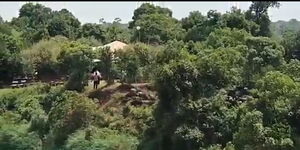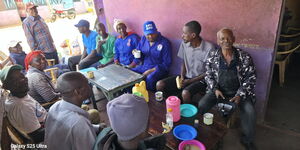A December 2020 report by the Africa Centre for Open Governance (AfriCOG) has shed light on how the Jubilee Government inflated road projects leading to embezzlement of taxpayers' money.
AfriCOG stated that Jubilee Administration used road construction projects as vehicles to budget for corruption.
A comparison between the Jubilee regime versus the previous Coalition Government revealed a preference for high-cost urban roads over more useful trunk roads, alongside an increase in costs per kilometer.
In 2016, President Uhuru Kenyatta stated that "In the last three years, my administration has tarmacked approximately 3,000 km—or an average of 1,000 km per year."
"In 2013, we promised to undertake the most aggressive road construction programme ever seen in Kenya. With 1,950 km of new roads completed and another 7,000 km under different phases of construction, we have kept the promise," he added in 2017.
AfriCOG said that published data show that during the Jubilee Administration’s first term (2013-2017), the national network of paved roads increased by 5,800 km, from 7,685 km to 13,485 km. This includes 2000 km of newly paved roads that were under construction when the Jubilee administration took over.
The data shows that in total, Jubilee Administration-initiated road projects in this period add up to 3,120 km (the balance being roads built by county governments).
The NGO claimed that Kenyatta exaggerated his administration’s achievements. It added that in 2016 Jubilee argued that it funded development projects using the Eurobond I loan despite the national government’s budget for that year being fully funded without the use of the Eurobond proceeds.
“As one of the major infrastructure sectors, it would be expected that the roads would have absorbed a substantial share of the Eurobond funds. This is not evident. On the contrary, the Economic Survey reflects 465 km of new road valued at Kshs 42.8 billion started in FY14/15 down from 1,091 km valued at Kshs 71.4 billion started in the previous year, while actual development expenditure on roads declined to Kshs 80.6 billion from Kshs 87.6 billion. Thus, there is no evidence at all of a Eurobond boost to the road-building budget,” it stated.
The Uhuru-led government spent Ksh 614 billion on roads during its first term, 60 percent more than its predecessor’s Ksh 376 billion. But contrary to the president’s claims, the higher outlay is not on account of a massive road-building programme.
Measured in terms of length of roads or number of projects, road construction peaked in 2012, the last year of the coalition government, at 3,200 km of road under construction. These roads constitute the bulk of the 5800 km of roads completed during the Jubilee administration’s first term.
In the first term (FY2013/14-FY17/18) the Jubilee administration initiated 80 road projects with a total of 3,120 km, which just about matches the roads that its predecessor had under construction at the end of its term. The 3120 km of road commissioned by the Jubilee administration were contracted at a cost of Kshs. 303 billion.
This works out to an average cost of Ksh 96 per km compared to an average cost of Ksh 51 per km for the portfolio inherited from the President Mwai Kibaki-led administration. The inflation comes to Ksh 45 million more per km and a 90 percentage increase.
“An increase in the unit cost of a road project portfolio can result from different factors. These include actual increases in construction costs (i.e. labour and materials), a different mix of the types of roads (complicated urban roads are more expensive to build than trunk roads), market factors such as lack of competition in the construction industry, project management challenges, as well as corruption,” the NGO stated.
At the start of the Jubilee administration’s tenure, roads costing less than Ksh 50 million per km account for 58 percent of the portfolio in volume terms and 32 percent in value terms. Roads costing under Ksh 100 million account for 72 per cent of the budget and 88 percent of the volume. There are only two roads costing more than Ksh 200 per km, and none costs more than Ksh 300m per km.
Five years later, nine roads costing over Kshs 300 per km account for 20 percent of the portfolio in value terms but only 3 percent in volume terms. The cost of these roads ranges from Kshs 300 billion per km (Nyamasara-Kisumu Airport) to an eye-popping Kshs 1 billion per km (Mombasa Southern Bypass - Dongo Kundu). The share of Kshs 200- 300m per km roads also increases from 2 to 7 percent of the portfolio in value terms.
AfriCOG further stated that the small number of mega-projects are not an isolated phenomenon, but rather part of a shift of the portfolio composition to bigger projects. The number of projects costing more than Ksh 5 billion increases from three to twenty. This would be explicable if the Jubilee administration building much longer roads, but this is not the case.
“As per the construction cost indices compiled by the KNBS, road construction cost increased 26 percent between 2013 and 2017, comprising of 13 percent increase in civil engineering costs (materials and other non-labour), and a 42 percent increase in labour costs. Thus, even excluding the high-cost roads, the cost escalation is still 31 percent higher than what can be explained by inflation.
If the cost increase was only due to inflation, the unit cost, excluding the high-cost roads, would be at most Kshs 64 million per km, that is Kshs 16 million per km lower. As observed at the outset, one of the corruption impacts is associated with the distortion of priorities where high return projects are crowded out by low return projects that have more corruption opportunities.
“In this regard, we are compelled to ask how spending Kshs 60 billion on 100 km of urban roads can be justified vis a vis trunk and rural access roads. In term of roads, at a unit cost of Kshs 64 million per km, this is enough to build 760 km of trunk roads,” the report written by economist David Ndii raises concerns.












